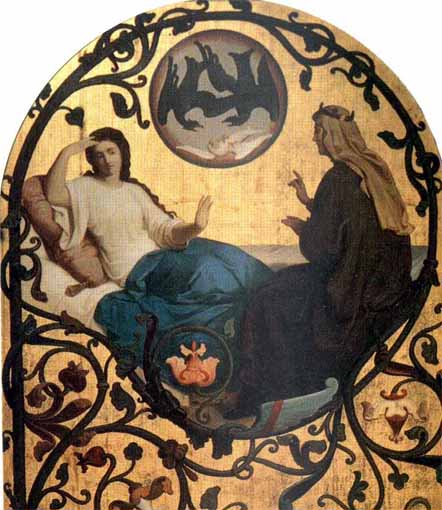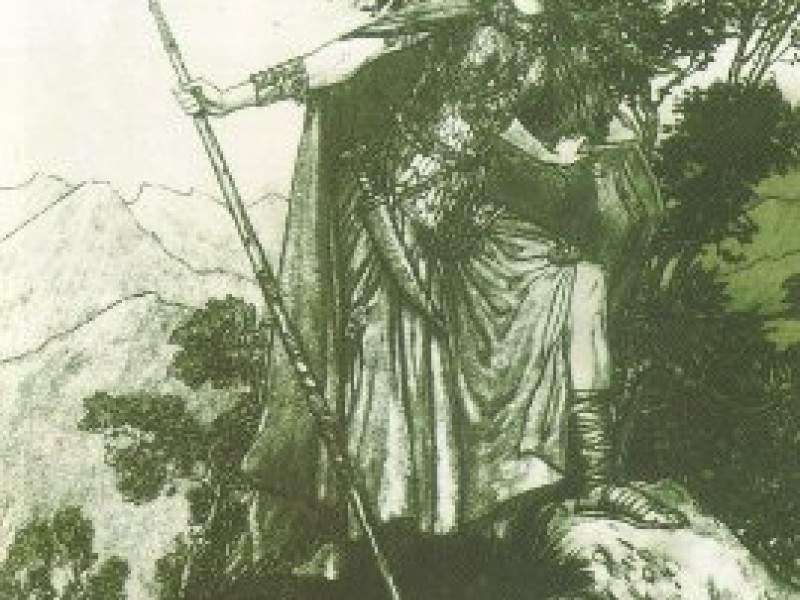Kriemhild
Krimehild was the wife of Siegfried (Sigurd) and Etzel (Atli). Kriemhild (Grimhild or Gudrun) was the beautiful daughter of King Dancrat (Guiki) of Burgundy and Uote (Grimhild). She was the sister of Gunther, Gernot and Giselher. (In the Volsunga Saga, Hogni (Hagen) was her brother, while the Thiðrekssaga said that Hogni was her half-brother.)
The story began with her vision of her future husband in a form of a falcon, but two eagles (Gunther and Hagen) destroyed her falcon.
When Siegfried arrived at Worms, Kriemhild only saw the young hero from a distance. She fell in love with Siegfried. It was only after the war against the Saxons (a year later) that Kriemhild was introduced to Siegfried.
Gunther allowed Siegfried to marry Kriemhild if the hero helped him to win Brunhild's hand in marriage. Brunhild was the warrior queen from Isenstein.
The tragedy was that Siegfried foolishly allowed his pride to take a ring and girdle that belonged to Brunhild. Kriemhild allowed herself to be drawn into argument over precedence, and mistakenly believed that Siegfried had taken Brunhild's virginity, not her brother. Since Kriemhild had Brunhild's ring and girdle in her possession, then everyone else would also believe Kriemhild's claim over who took Brunhild's virginity.
This led to Hagen and Gunther conspiring to murder Siegfried. Hagen managed to deceive Kriemhild into disclosing Siegfried's weakness. Then Hagen plunged the spear into Siegfried's back, as the unsuspecting hero drank water from the river.
Kriemhild was inconsolable over Siegfried's death and knew Hagen and her brother Gunther were responsible for her husband's murder. To further antagonise Kriemhild, Hagen stole her inheritance, the Nibelung treasure. Hagen sank the treasure into the Rhine. Neither Gunther nor her younger brothers bothered to punish Hagen for Siegfried's death, or for stealing their sister's treasure.
Her family insisted that she marry Etzel, a heathen king, even though she herself was a Christian. Seeing that her younger brothers were unsupportive, Kriemhild decided to win allies away from her home, so she agreed to marry Etzel. Rudiger of Pochlarn, Etzel's ambassador, gave his promise to protect and avenge her from any wrongdoings against her.
Among the stops, Kriemhild visited Rudiger's wife and unnamed daughter. Kriemhild gave her gold bracelets to Rudiger's daughter before they set out again, towards Hungary. They met Etzel in Vienna, Austria, where they were introduced and later married. Etzel took his new wife to Etzelnburg, Hungary.
Kriemhild gave birth to a son named Ortlieb. But the marriage was unhappy because Kriemhild still wept over the death of her first husband. Thirteen years after Kriemhild's marriage to Etzel, Kriemhild deceived her husband, asking her husband to invite her brothers to Hungary.
Her plan was to turn Etzel's subjects and vassals against Hagen and her brothers. It was Kriemhild who was vindictive, not her husband Etzel. Since she was a woman, the poem showed her in a poorer light; though Hagen was the one who murdered her husband and stole her inheritance. Kriemhild tried to win Etzel's champions to her side, either by her charms or bribery. Kriemhild offered Bloedelin (Etzel's vassal), so he offered Nuodung's destined bride in marriage and all the land that belonged to Nuodung. It was Bloedelin who provoked Dancwart (Hagen's brother) into battle, and lost his life.
She even used her young son Ortlieb. Kriemhild told her seven year old son to slap Hagen in the face. Hagen retaliated by decapitating Ortlieb with his sword. This upset Etzel, but it offended every one of Etzel's warriors.
Kriemhild made Rudiger also compelled into joining the conflict by reminding him of his oath to avenge any wrongdoing done to her. Rudiger's death led to Dietrich's men joining the battle, before Dietrich himself confronted and captured Gunther and Hagen.
With Gunther and Hagen bound helplessly as her prisoners, she once again demanded the return of her treasure from Hagen, but he defiantly refused. She had her brother killed, and severed Hagen's head. Hagen's death by Kriemhild upset Etzel and Dietrich. Etzel ordered Hildebrand to kill his wife. The poem ended with Kriemhild's death at Hildebrand's hand.
In the Norwegian saga Thidrekssaga, she was known as Grimhild, while in the Icelandic Edda and the Volsunga Saga, she was called Gudrun. The Thidrekssaga tended to use the Norse or Icelandic names, but it followed the German tradition rather than the Icelandic/Norse tradition. In the Icelandic tales, Gudrun took revenge upon her husband by killing Atli for the death of her brothers. In both the Thidrekssaga and the Nibelungenlied, she desired and plotted her brothers' death, not that of Etzel/Attila.
In the Volsunga Saga and the two Eddas, Gudrun only had three brothers, Gunnar (Gunter), Hogni (Hagen) and Guttorm (Guthorm). In Thidrekssaga, the number of brothers varied from four to five.
In chapter 169 of Thidrekssaga, she had three brothers, Gunnar, Gernoz and Gislher, and a half-brother Hogni. In the next chapter (170), she had one extra brother, Guthorm, who was never mentioned again in the Thidrekssaga. Also in 169, her father was named Aldrian, but in 170, he was named Irung and her mother, Oda.
Since the Thidrekssaga was more like the Nibelungenlied, I would mention other differences found in the Icelandic versions. In the Volsunga Saga, she was more forgiving to her brothers, even though they plotted her husband's death (Sigurd's), than she was to her second husband Atli (Etzel) for killing her brother.
Another difference was why Sigurd married Gudrun instead of Brynhild. In the Icelandic texts, her mother Grimhild was a witch who made a potion so that Sigurd would forget about Brynhild. In Thidrekssaga however, Sigurd broke his oath to Brynhild because he thought that Gudrun having brothers would make powerful allies, whereas Brynhild had not. Of course, Sigurd would rue the day he married her because of her brothers.
Related Information
Name
Kriemhild.
Grimhild, Gudrun (Norse).
Related Articles
See also Gudrun.
Gunther, Gernot, Giselher, Hagen, Siegfried, Siegmund, Brunhild, Etzel, Rudiger, Dietrich, Hildebrand.
Nibelungenlied, Völsunga Saga.
By Jimmy Joe





